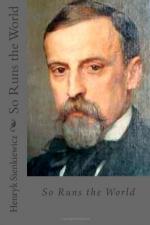But such an end is a new surprise. Here we have before us nineteen volumes, and in those volumes, as Zola himself says, tant de boue, tant de larmes. C’etait a se demander si d’un coup de foudre, il n’aurait pas mieux valu balayer cette fourmiliere gatee et miserable. And it is true! Any one who will read those volumes comes to the conclusion that life is a blindly mechanical and exasperating process, in which one must take part because one cannot avoid it. There is more mud in it than green grass, more corruption than wholesomeness, more odor of corpses than perfume of flowers, more illness, more madness, and more crime than health and virtue. It is a Gehenna not only dreadful but also abominable. The hair rises on the head, and in the mean while the mouth is wet and the question comes, will it not be better that a thunderbolt destroyed cette fourmiliere gatee et miserable?
There cannot be any other conclusion, because any other would be a madman’s mental aberration, the breaking of the rules of sense and logic. And now do you know how the cycle of these novels really ended? By a hymn in the worship of life.
Here one’s hands drop! It will be useless work to show again that the author comes to a conclusion which is illogical with his whole work. God bless him! But he must not be astonished if he is abandoned by his pupils. The people must think according to rules of logic. And as in the mean while they must live, consequently they wish to get some consolation in this life. Masters of Zola’s kind gave them only corruption, chaos, disgust for life, and despair. Their rationalism cannot prove anything else, and if it did, it would be with too much zeal, it would overstep the limits. To-day the suffocated need some pure air, the doubting ones some hope, tormented by uneasiness, some quietude, therefore they are doing well when they turn therefrom where the hope and peace flow, there where they bless them and where they say to them as to Lazarus: Tolle grabatum tuum et ambula.
By this one can explain to-day’s evolutions, whose waves flow to all parts of the world.
According to my opinion, poetry as well as novels must pass through it—even more: they must quicken it and make it more powerful. One cannot continue any longer that way! On an exhausted field, only weeds grow. The novel must strengthen the life, not shake it; make it nobler, not soil it; carry good “news,” and not bad. It does not matter whether this which I say here please any one or not, because I believe that I feel the great and urgent need of the human soul, which cries for a change.
PART THIRD
WHOSE FAULT?
A Dramatic Picture in One Act.
CHARACTERS:
Jadwiga Karlowiecka.
Leon—A Painter.
A Servant.
In the House of Jadwiga Karlowiecka.




